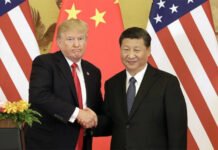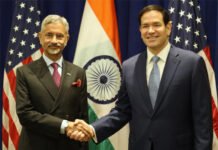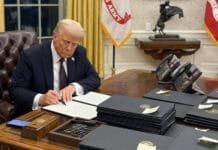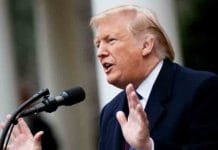INVC NEWS
Washington, DC — : Tensions between India and Pakistan drew global attention once again after US President Donald Trump made a high-voltage statement warning that if a war breaks out between the two nations, America will not enter any trade agreement with either country. Trump’s remarks come amid renewed speculation over past US involvement in easing border tensions and ongoing trade discussions between Washington and New Delhi.
Trump Claims Credit for Ceasefire, Links Trade to Peace
Addressing reporters at Joint Base Andrews following a flight on Air Force One, Trump took full credit for diffusing a potential nuclear confrontation between India and Pakistan. He said, “We stopped the possibility of nuclear war through trade, not bullets. Every time both countries fought in the past, compromise came after the damage. This time, we reached understanding before it turned into war. I’m proud of this achievement.”
Trump reiterated that America is close to finalizing a trade agreement with both India and Pakistan, but emphasized that ongoing peace is a non-negotiable prerequisite. “If they start shooting again, we are out. I will not pursue a trade agreement with anyone firing bullets or threatening nuclear action,” he warned.
India Reacts Firmly: No Third-Party Mediation Involved
India responded sharply to Trump’s repeated claims, firmly rejecting the idea of any third-party mediation. External Affairs Minister S. Jaishankar stated that the ceasefire agreement with Pakistan during Operation Sindoor was reached through direct bilateral negotiations without foreign intervention.
Jaishankar clarified India’s longstanding position: “Our agreements, especially those concerning military engagement, are sovereign decisions. No outside country was involved in any form of negotiation.”
Trump’s Repeated Assertions Despite Indian Denials
Despite India’s categorical denial, Trump has made similar remarks ten times between May 10 and May 31, stating that his administration successfully prevented a nuclear war between India and Pakistan. During a press briefing, Trump said, “I want to thank the leaders of both countries for showing restraint. We stopped a major disaster.”
The remarks followed a press event related to Elon Musk’s exit from a US administration task force, during which Trump used the opportunity to revisit the India-Pakistan issue.
America’s Red Line: No Trade With Warring Nations
Trump underscored his trade philosophy, asserting that the US cannot engage economically with nations involved in active conflict. “We do not do business with countries who are shooting at each other. Trade follows peace,” he remarked, highlighting that nuclear-armed neighbors should focus on diplomacy over escalation.
Without directly naming Indian or Pakistani leaders, Trump referred to them as “great leaders” who understood the risk and cooperated to bring about de-escalation. He credited trade diplomacy and US pressure for halting what he termed a “very dangerous standoff.”
India-US Interim Trade Agreement Likely by June 25
Trade negotiations between India and the United States have accelerated over recent weeks. As per diplomatic and commerce sources, an interim trade deal is expected to be finalized by June 25, setting the groundwork for a broader Bilateral Trade Agreement (BTA).
India’s Commerce Minister Piyush Goyal visited Washington D.C. last week and met US Commerce Secretary Howard Lutnick twice to expedite the discussions. Key trade issues include tariffs on steel, technology exchange, pharmaceutical exports, and agricultural goods.
Suspended Tariffs and Critical Deadlines: What Lies Ahead
As part of ongoing discussions, the 26% retaliatory US tariff on Indian goods, which was previously announced, remains suspended until July 9. This decision has provided a temporary relief window for exporters on both sides.
However, a 10% baseline tariff imposed by the US is still in place. Both sides are reportedly working on modular relief mechanisms to balance trade disparities before the broader framework is adopted.
The geopolitical implications of Trump’s remarks have once again drawn attention to the delicate balance between diplomacy, defense, and trade in South Asia. With nuclear-capable neighbors like India and Pakistan, statements from US leadership continue to influence the narrative both globally and in domestic political discourse.
















